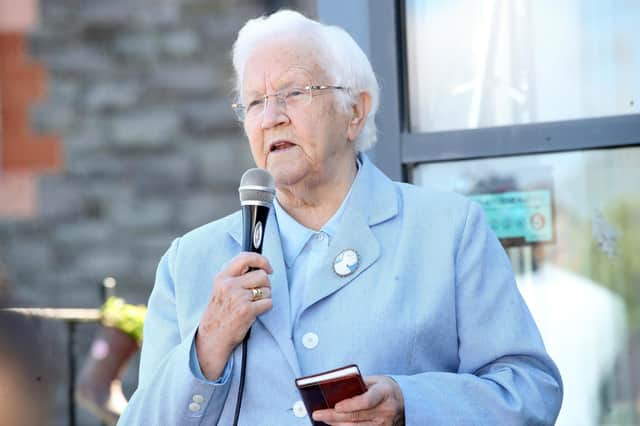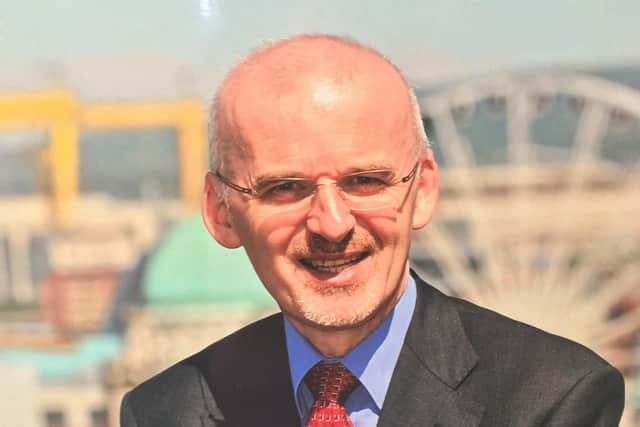Philip McGarry: Baroness May Blood’s values of basic human decency and justice deserve to prevail over those of the terrorists


It is undoubtedly a measure of how abnormal our political dialectic is in Northern Ireland that this stood out as a most unusual statement. I can’t recall when I last heard a public figure state such a sentiment so trenchantly.
There is probably no other western democracy where it would be seen as ‘impolite’ to assert that the killing of citizens for political purposes is despicable, and indeed incompatible with democracy.
Advertisement
Hide AdAdvertisement
Hide AdMay Blood’s attitude towards paramilitaries was influenced by many factors.


She was a woman of faith with a strong moral conviction, and totally anti-sectarian.
But crucially, as a passionate advocate for the people of the Shankill Road and similarly deprived areas, she abhorred the shooting and beating of local young people, the protection rackets, the drug dealing, the relentless intimidation of the population, and indeed the ‘invitation’ to republican paramilitaries to attack the people as a crude form of sectarian revenge.
As a trade unionist she saw the energies of young men being turned away from the fight against poverty and unfairness, and instead into the dead end of physical force unionism, which all too often ended in jail or death.
Advertisement
Hide AdAdvertisement
Hide AdAnd once they were tantalised/coerced down that line, their chances of improving their quality of life and that of their families all but disappeared.
I have met (typically many years later) a number of former paramilitaries professionally. Many deeply regretted what they did, and wished they had taken the alternative path of fighting for genuinely worthy causes such as economic and social justice.
It is worth thinking of what our society might be like if we had never suffered from the cancer of paramilitarism.
In the 20th century the first manifestation of arming people and setting them against their fellow citizens was the drilling of thousands of UVF men, leading in 1912 onto the shameful and chilling phrase in the Ulster Covenant ‘all means which may be found necessary’.
Advertisement
Hide AdAdvertisement
Hide AdThis was soon mirrored by the Irish Volunteers, the IRB and the 1916 Proclamation which invoked ‘the blessing of the Most High God upon our arms’.
The vicious conflict from 1919 to 1922 led to the murder of approximately 300
people in Belfast by loyalists, and 200 by republicans. Was that not a disaster for our city?
And then we had 3,000 killed by paramilitaries from 1966 onwards.
Advertisement
Hide AdAdvertisement
Hide AdWe remain a bitterly divided society, both physically and psychologically; unsurprisingly given the amount of violence briefly covered above. Can anyone honestly believe that any, never mind all, of that killing was acceptable?
And yet despite everything, direct criticism of physical force nationalism and unionism is remarkably muted, such that when a respected public figure like Avila Kilmurray states: ‘May Blood hated paramilitaries’, it almost sounds jarring!
After all, we are told so often that we should be grateful to the UVF/IRA that they are no longer killing our neighbours, and that the best response to paramilitaries is to talk to them, and try and give them what they want.
This approach was epitomised by Tony Blair when in 2000 he told an exasperated Seamus Mallon : ‘Your problem Seamus is that you don’t have any guns’.
Advertisement
Hide AdAdvertisement
Hide AdThe 3,000 people in Northern Ireland killed by paramilitaries represented an astonishing one in 500 of our population of 1.5 million.
To put that in context, the United States, with a population 200 times greater of over 300 million, invaded two countries and set the world alight with their catastrophic overreaction to the 3,000 killings on September 11, 2001.
What might their response have been if they had suffered proportionately the same number of deaths as Northern Ireland, which would have been 600,000!
To put it the other way round, just imagine if we had had only the same proportion of our people killed by paramilitaries as the USA; this would amount to a grand total of 15, 10 by republicans, and five by loyalists. Yes, just 15! How different Northern Ireland would be today.
Advertisement
Hide AdAdvertisement
Hide AdThere are many – sadly - who believe that the killing in our country has in some way been worth it. But there is an alternative view. And few people represented that view with greater moral integrity than the late Baroness May Blood.
She ‘hated’ the paramilitaries, of all descriptions. She genuinely liked people, irrespective of their background, and particularly those who were disadvantaged.
Let all of us work to ensure that it is her values of basic human decency and justice that prevail, and not the moral code of those who shoot their fellow countrymen and women.
Dr Philip Mc Garry FRCPsych is a consultant psychiatrist